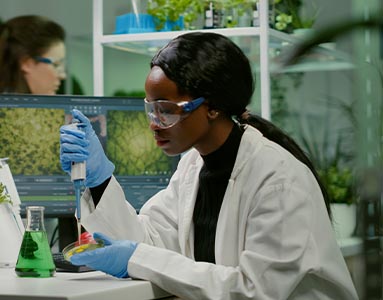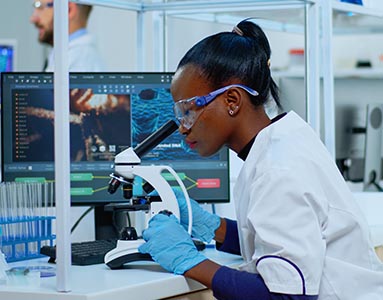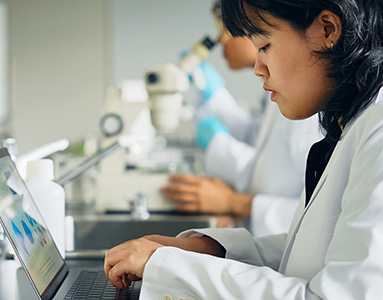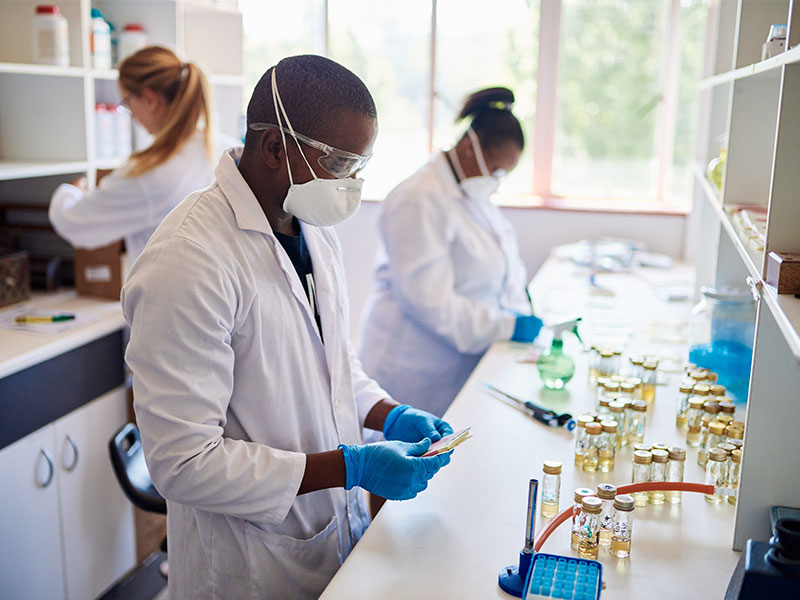Bachelor of Science in Chemistry | Biochemistry
The FAMU Department of Chemistry is approved by the American Chemical Society (ACS) to offer the BS Chemistry degree with ACS certification. ACS is one of the largest scientific organizations in the world and it is the standard for chemical education. Our curriculum is designed to equip graduates with a thorough knowledge of the chemical sciences. Our Student Academic and Professional Development (SAPD) series provides a comprehensive and cumulative assessment of the curriculum with verbal reasoning and standardized exam (GRE) preparation integrated in the four years. Majors are equipped with the academic and professional skills needed for success after receiving their degree, whether it be immediate employment, graduate school or professional school.

What is Biochemistry?
- Biochemists study the chemical and physical principles of living things and of biological processes, such as cell development, growth, heredity, and disease. Epidemiologists are public health workers who investigate patterns and causes of disease and injury.

Biochemistry Careers
- Biochemists typically work in laboratories and offices, to conduct experiments and analyze the results. Biochemists need a Ph.D. to work in independent research positions.
- Bachelor’s and master’s degree holders are qualified for some entry-level positions.
- Epidemiologists seek to reduce the risk and occurrence of negative health outcomes through research, community education and health policy.
- Epidemiologists typically need at least a master’s degree to enter the occupation. They may have a master’s degree in public health (MPH) or a related field, and some have completed a doctoral degree in epidemiology or medicine.

Biochemistry Employment Expectations
- Employment of biochemists is projected to grow 6 percent from 2024 to 2034, faster than the average for all occupations. About 2,900 openings for biochemists are projected each year, on average, over the decade.
- Employment of epidemiologists is projected to grow 16 percent from 2024 to 2034, much faster than the average for all occupations. About 800 openings for epidemiologists are projected each year, on average, over the decade.

Biochemistry Frequently Asked Questions (FAQs)
Q: What is the mean salary for biochemists?
A: The median annual wage for biochemists was $103,650 in May 2024. The lowest 10 percent
earned less than $64,890, and the highest 10 percent earned more than $168,900.
Q: What is the mean salary for epidemiologists?
A: The median annual wage for epidemiologists was $83,980 in May 2024. The lowest 10
percent earned less than $56,950, and the highest 10 percent earned more than $134,860.
Q: Is your Biochemistry program certified by the American Chemical Society (ACS)?
A: Yes, our Biochemistry program is a track that is certified by ACS.
Department of Chemistry Faculty
| Name | Phone | |
| Dr. Mohamed Abdel Salam Instructor |
mohamed.salam@famu.edu | |
| Dr. Natalie Arnett Associate Professor |
natalie.arnett@famu.edu | 850-412-5329 |
| Dr. James Bouyer Associate Professor/Department Chair |
james.bouyer@famu.edu | 850-599-3638 |
| Dr. Beni B. Dangi Associate Professor |
beni.dangi@famu.edu | 850-599-8419 |
| Dr. Suresh Eyunni Instructor |
suresh.eyunni@famu.edu | |
| Mr. Casanova Jackson Associate Instructor |
casanova.jackson@famu.edu | |
| Dr. Margaret Lyles Associate Instructor |
margaret.lyles@famu.edu | |
| Dr. Nelly Mateeva Professor |
nelly.mateeva@famu.edu | 850-412-5662 |
| Dr. Bereket Mochona Associate Professor |
bereket.mochona@famu.edu | 850-599-3638 |
| Dr. Musiliyu Musa Professor |
musiliyu.musa@famu.edu | 850-599-3509 |
| Dr. Edith Ndubuaku Onyeozili Professor |
edith.onyeozili@famu.edu | 850-412-5328 |
| Dr. Sanuja Pitigalaarachchige Associate Instructor |
sanuja.pitigalaarachchige@famu.edu | |
| Dr. Bishnu Regmi Associate Professor |
bishnu.regmi@famu.edu | 850-599-8424 |
| Dr. Keerthi Senevirathne Associate Professor |
keerthi.senevirathne@famu.edu | 850-599-3638 |
| Dr. Ngozi Ugochukwu Professor/Associate Dean |
ngozi.ugochukwu@famu.edu | 850-412-7124 |





